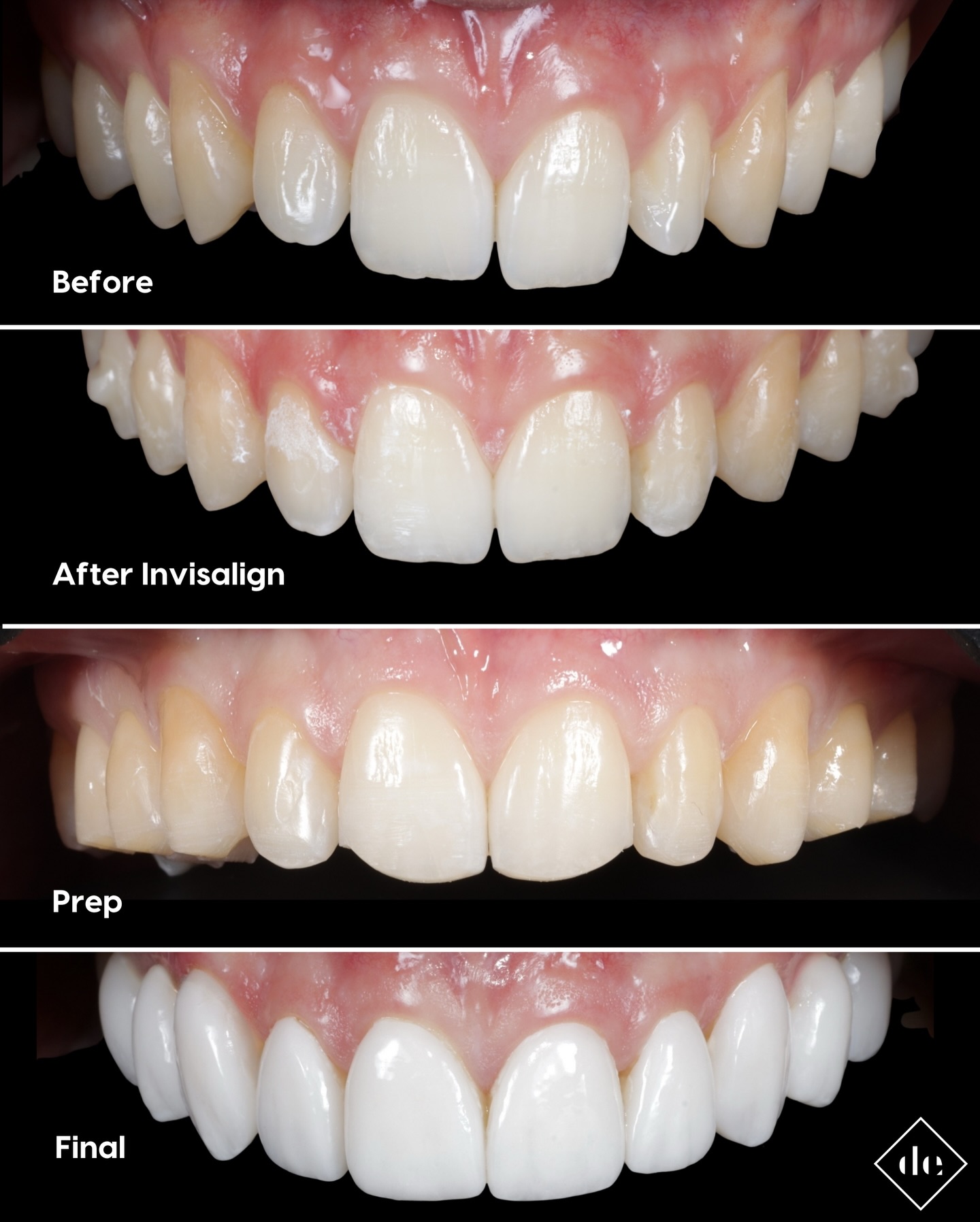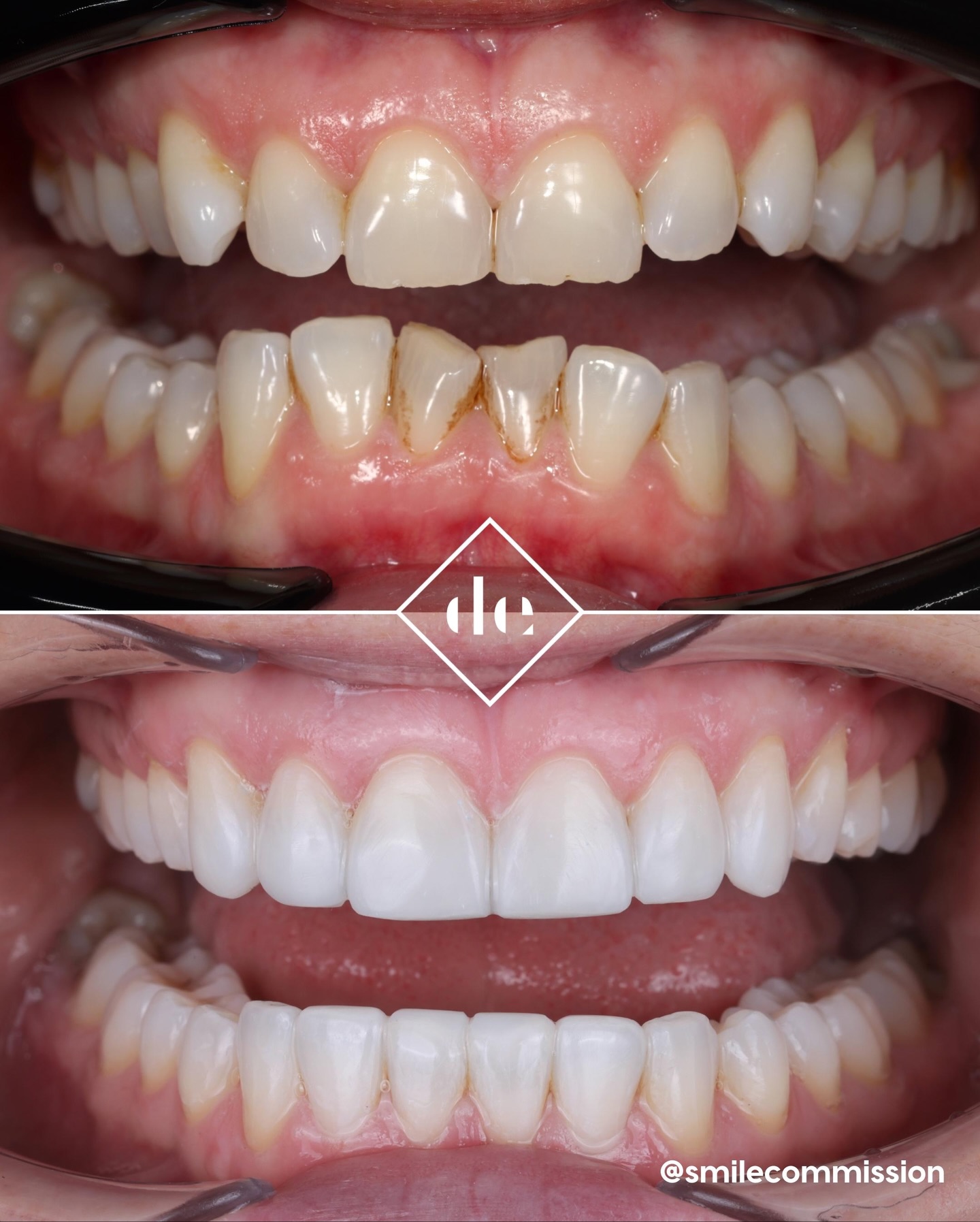How sugar affects your teeth - what every patient should know
Diet plays a vital role in protecting your oral health. At Dental Excellence, we help patients across Liverpool, Chelsea and Dublin understand how sugar impacts the teeth - and what small, sustainable changes can help you prevent decay, protect enamel and preserve your smile.

- Honest advice from highly trained clinicians
- Trusted by patients across South Liverpool, West London and Dublin
- Preventative care and personalised treatment plans
Frequently asked questions
What effect does sugar have on teeth?
Sugar can be very harmful to your teeth, especially in large amounts. Even natural sugars in foods such as fruit can be damaging in large and consistent doses. This is why it is important to regulate your diet and reduce your sugar intake as much as possible to maintain the health of your teeth. Too much sugar can lead to cavities developing and, if left untreated, could potentially cause tooth loss. This is the most extreme outcome, however, and if you clean your teeth regularly using the proper techniques, you will likely avoid the more serious cases of sugar damage.
The process behind sugar causing damage to your teeth is more complex than many people realise. The sugar itself does not corrode your teeth. Instead, it feeds harmful bacteria, which then produce the acids that cause tooth decay. These acids corrode the teeth and can develop into bacterial infections. It is these infections that eat into the tooth, creating a cavity. As you can see from this process, it does not happen instantly, and if you brush your teeth properly after eating sugary foods, you can prevent the damage from starting.
The longer you leave your teeth without brushing after eating sugary foods, the higher the chance that this process will begin and harmful bacteria will start to form in your mouth. Professional advice and guidelines may sometimes seem confusing, as dentists recommend waiting around an hour to brush after eating sugary foods. This is to prevent sugar from being spread around the mouth when you brush. After an hour, the sugar is stuck to your teeth, meaning that when you brush, it can be more effectively removed.
Which foods and drinks should I avoid?
As a general rule, you should avoid food and drink with a high sugar content. Sweets, chocolate, biscuits and cake are the main culprits, as they often contain a large amount of sugar alongside other unhealthy components. Fizzy drinks, alcoholic drinks and some hot drinks also contain high amounts of sugar, especially cocktails. These types of drinks are often made with syrup, which is primarily sugar, creating an extremely unhealthy drink that can be very harmful to the teeth. Coca-Cola in particular is known for its high sugar content and, if consumed regularly, can quickly lead to dental issues.
Sugar makes its way into almost every food - even fruit, which contains natural sugars. While these are generally less corrosive than the sugars found in chocolate and sweets, they are still unhealthy if left on your teeth. The best way to protect your teeth is to cut out as much sugar as possible from your diet and brush after consuming food or drink with a high sugar content. Cutting your favourite drinks and snacks out of your diet can be difficult, but a good option is to choose sugar-free drinks or substitute sugar with sweeteners where you can.
Sticky foods such as dried fruits and toffee can also be harmful to your teeth, as they can stay on the surface longer and be harder to remove. You should try to cut out these types of food from your diet or, if you do eat them, brush and floss afterwards to prevent them from causing long-lasting damage.
Will sugar damage my tooth's enamel?
When sugar is left on the surface of your teeth, it feeds the bacteria that create acid, which then eats away at your tooth enamel. These harmful acids work against the healthy minerals in your mouth. Fluoride is another mineral that promotes repair and helps rebuild enamel when it becomes damaged. It can even reverse early decay. However, this can only happen if your teeth are clean and free from harmful acids. If your fluoride levels are low, you can use mouthwashes and toothpaste containing fluoride, which will then help rebuild your enamel.
If your teeth have become damaged, you do not have to rely solely on external products to provide the correct minerals. While these can give you a boost, your body’s natural saliva also helps bathe your teeth in minerals. Stimulating saliva is a good way to coat your teeth in these vital minerals. The best way to do this is by cutting out sugar and chewing sugar-free gum or high-fibre vegetables. This will get your saliva flowing and gradually help to rebuild your enamel. Other foods, such as dairy products, contain calcium and phosphates, which help strengthen teeth, so you should try to incorporate these into your diet.
How do I protect my teeth from sugar?
The best way to protect your teeth from the effects of sugar is by managing your sugar intake. It is easy to advise against eating sugary foods, but the reality is that many foods have a high sugar content and they can be enjoyable as an occasional treat. When eating sugary foods, it is important to space them out and not overload your teeth with too much sugar at once. This helps prevent acid from building up quickly before you are able to do anything about it. Brushing at the right times is also key to preventing sugar from lingering on your teeth and causing decay.
Chewing gum that contains xylitol - a sweetener used as an alternative to sugar - can help stimulate saliva in your mouth and reduce sugar build-up. Drinking milk can also help neutralise harmful acids and protect your teeth, especially if you are not able to brush soon after eating. Staying hydrated is equally important, as saliva production depends on it. If you are dehydrated, your body will naturally produce less saliva and therefore have nothing to wash away the sugars collecting on your teeth. Using these methods together will give you the best chance of avoiding tooth decay.
Visiting your dentist regularly is also important to ensure your teeth remain healthy and that no serious damage has occurred. While you can brush and check your teeth yourself, there are large areas of your mouth you cannot see, and you may not realise the seriousness of damage if you are unable to detect it. A dentist can give you in-depth feedback on the condition of your teeth and provide important advice on what extra steps you may need to take or what habits you may need to change to prevent serious damage. They may also give you helpful tools to use to keep your teeth clean. For example, they may provide you with a reusable floss stick that allows you to floss easily no matter where you are.
There are also other products you can use to help make sure your teeth are as clean as possible, such as tablets that coat your teeth and highlight plaque in your mouth. This gives you an accurate view of how well you are brushing and helps ensure no harmful build-up is left behind.
Are children's teeth at risk of damage from sugar?
When it comes to sugar damage, age is irrelevant, as the same process occurs where sugar feeds harmful bacteria, creating acids that begin to break down your enamel. Children are arguably more susceptible to this due to their diets often including more sweets and chocolate than adults, and their brushing methods potentially being less effective. Although you may think children get a “second chance” when their baby teeth fall out and are replaced by adult teeth, decay can still lead to infection. If cavities occur in a child’s teeth, this can lead to gum disease and potentially damage the adult teeth that are yet to come through.
Once the adult teeth have come through, it is extremely important to look after them because you only get one set. If decay occurs and is not treated, it can lead to severe damage, making the tooth unrepairable. Severely damaged teeth may need to be removed, but that does not mean you have to live with a gap in your smile - we can help restore it. At Dental Excellence, we offer a dental implant service that, using modern technology and the incredible skill of our team, allows us to replace your damaged tooth with an artificial one. Choosing this treatment means we can completely restore your smile and even make it look better than before.
What treatments are available if my teeth are damaged?
Thanks to modern advancements in dental technology, we are able to offer a wide range of treatments, from Same Day Smile makeovers to long-term dental replacements. Sugar damage can vary in severity, with the most serious cases resulting in tooth loss. Other types of damage can cause discolouration or cavities. If the damage is not severe and is limited to discolouration, you may be eligible for a Same Day Smile makeover. At Dental Excellence, we offer both composite bonding treatments (which include composite veneers) and porcelain veneers. Our state-of-the-art technology and highly skilled team allow us to carry out veneer treatments in a single day, meaning you can walk away with a perfect smile.
Veneers are a great choice if your teeth are only slightly damaged on the surface. Composite veneers consist of a layer of material placed over the teeth, while porcelain veneers involve removing a thin layer of enamel and replacing it with a veneer. This means the majority of your natural tooth remains untouched, but its appearance is dramatically improved and whitened. Veneer treatments are extremely popular at Dental Excellence due to their comfortable application and quick treatment time.
If your teeth have become severely damaged or you have missing teeth, they can be replaced with an artificial tooth. We do this using a titanium screw that fuses with your jaw and provides a point for the artificial tooth to be fixed to. Not only can a dental implant fully restore your smile, but it can also fill the gap where your tooth once was and prevent infection in your gum. With our techniques and sterile facility, we are able to safely carry out this procedure - and while it may seem a little invasive, you will never look back once you see the results.
Will sugar affect my gums?
It is not just your teeth that you need to look after, as your gums are also at risk of infection. This often occurs as a result of untreated tooth decay that has spread and affected the gums. The same bacteria and acids that cause tooth decay can also attack your gums and lead to diseases such as gingivitis, which may cause the gums to recede. If you eat sugary foods and do not properly clean your teeth or floss, sugar can build-up in the gaps between your teeth and begin to harm your gums.
Just like with teeth, sugar can cling to your gums and contribute to disease and other issues. If left untreated, these problems can cause bleeding and sore gums. Eating sugar regularly without cleaning properly can make your gums much more sensitive, leading to discomfort or pain when sugar comes into contact with them. Combined with other harmful, highly acidic foods, sugar can cause significant damage - which is why maintaining good oral hygiene is so important.
Will natural sugars also damage my teeth?
Sugar is found in many foods, whether it occurs naturally in fruits or is added to products. Typically, added sugar, such as that found in chocolate and sweets, is worse for your teeth, but that does not mean natural sugars will not cause harm. Natural sugars contribute to tooth decay in the same way added sugars do - by feeding the bacteria in your mouth that create harmful acid. When it comes to sugar in food, it is important not to be naive and to make sure you brush thoroughly, particularly after eating fruits and other foods containing natural sugars.
While fruits are healthy for you and contain minerals that contribute to your overall health, the sugars in them can still damage your teeth. Other factors, such as the pigments in certain fruits, can also affect your teeth. For example, eating a lot of dark fruits such as blueberries or blackberries can discolour your teeth over long periods of time. By brushing and flossing after eating fruits or other foods that contain natural sugars, you can greatly reduce the chance of sugars causing damage or your teeth becoming discoloured.
Which foods will cause the most damage to my teeth?
With sugary foods, some can be classed as more harmful to your teeth than others, mostly because of their consistency rather than the potency of the sugar. Foods with a high sugar content are generally more harmful to your teeth, but so are foods that are sticky and do not break down quickly. Sweets that dissolve quickly will spend less time in contact with your teeth and therefore cause less damage than sweets such as toffee, which can stick to your teeth. The longer sugar stays on your teeth, the more it is able to feed bacteria that produce harmful acids. With toffee, lollipops and other sticky foods, the sugar can remain on your teeth even after you have finished eating, giving it more time to cause harm.
Soft drinks are also extremely harmful to your teeth due to their high sugar content. If you do choose to drink soft drinks, it is recommended that you use a straw so the liquid spends minimal time in contact with your teeth, and with fewer teeth overall. Consuming a large amount over a prolonged period of time can cause the most serious issues, as the sugar will begin to build-up on the teeth and accelerate decay. Where possible, swapping sugar for sweeteners can help prevent decay. Other drinks, such as wine or other dark-coloured drinks, can also lead to tooth discolouration if consumed regularly.
Foods that are highly acidic also contribute to tooth decay. Pickled foods that contain high amounts of vinegar promote acid build-up, which leads to decay. Acid can also cause staining and long-term discolouration by damaging the enamel. At Dental Excellence, we have seen many cases of this where patients have come to us for a solution. If your teeth have become discoloured as a result, we can offer a same-day treatment that leaves your teeth looking better than ever. Our Same Day Smile makeover consists of treatments such as composite bonding or veneers, applied through a swift but effective process - meaning you can leave the same day with a perfect smile.
What are my options if I lose teeth from sugar damage?
Losing teeth to sugar decay does not happen overnight. There is an entire process - from the sugar entering your mouth and feeding harmful bacteria, to acids being created and damaging your teeth. Once the acid has created a cavity, there is usually time to have this treated or try to reverse the effects with healthy minerals. However, this is not always the case, and sometimes the damage can be severe, leading to tooth loss. This does not mean you have to live with a gap in your smile - you do have options to achieve a complete smile again.
One of the treatments we offer to solve this issue is dental implants. This treatment involves inserting an artificial tooth into your mouth in place of the missing tooth. Not only does this restore your smile, but it also protects your mouth from harm by filling a space that would otherwise be susceptible to infection. This is often the best option if you have lost teeth. However, if your teeth are not severely damaged but you would still like treatment to improve them, we also offer less intensive options that can whiten your teeth and make them appear straighter.





